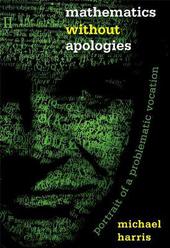
|
Mathematics without Apologies: Portrait of a Problematic Vocation
Paperback / softback
Main Details
| Title |
Mathematics without Apologies: Portrait of a Problematic Vocation
|
| Authors and Contributors |
By (author) Michael Harris
|
|
Preface by Michael Harris
|
| Physical Properties |
| Format:Paperback / softback | | Pages:464 | | Dimensions(mm): Height 235,Width 152 |
|
| Category/Genre | History of mathematics |
|---|
| ISBN/Barcode |
9780691175836
|
| Classifications | Dewey:510 |
|---|
| Audience | |
|---|
| Edition |
Revised edition
|
| Illustrations |
16 halftones. 34 line illus.
|
|
Publishing Details |
| Publisher |
Princeton University Press
|
| Imprint |
Princeton University Press
|
| Publication Date |
30 May 2017 |
| Publication Country |
United States
|
Description
What do pure mathematicians do, and why do they do it? Looking beyond the conventional answers--for the sake of truth, beauty, and practical applications--this book offers an eclectic panorama of the lives and values and hopes and fears of mathematicians in the twenty-first century, assembling material from a startlingly diverse assortment of scholarly, journalistic, and pop culture sources.
Author Biography
Michael Harris is professor of mathematics at the Universite Paris Diderot and Columbia University. He is the author or coauthor of more than eighty mathematical books and articles, and has received a number of prizes, including the Clay Research Award, which he shared in 2007 with Richard Taylor.
ReviewsWinner of the 2016 PROSE Award in Mathematics, Association of American Publishers One of Choice's Outstanding Academic Titles for the Year Winner of the 2016 PROSE Award in Mathematics, Association of American Publishers One of Choice's Outstanding Academic Titles for 2015 "Mathematics without Apologies is a kaleidoscope of philosophical, sociological, historical and literary perspectives on what mathematicians do, and why."--Amir Alexander, Nature "A wry and insightful look at what being a pure mathematician is all about, as seen from the inside."--Steven Strogatz, Physics Today "If you are interested at all in what mathematics really is and what the best mathematicians really do (and you're up for an intellectual challenge), I highly recommend that you get a copy and set some time aside for delving into this unusual book... Harris manages to move back and forth between the deepest ideas about mathematics at the frontiers of the subject, insightful takes on the sociology of mathematical research, and a variety of topics pursued in a sometimes gonzo version of post-modern academic style. You will surely sometimes be baffled, but definitely will come away knowing about many things you'd never heard of before, and with a lot of new ideas to think about."--Peter Woit, Not Even Wrong "Harris is the kind of mathematician one hopes to meet at an intimate dinner party. By sharing his professional and personal relationship to mathematics, [he] links art, philosophy, music, and literature to academic culture and research problems."--Library Journal "Extraordinary, extravagant... Harris is a polyglot, deeply learned. Threading through his remarkable book, unifying it, is Hardy's lament regarding whether a pure mathematician can make a claim that the vocation has a philosophically 'useful' purpose. Harris's reply is multivalent, persuasive, and profound. A book to be read and then read again."--Choice "The erudition displayed by Harris in this book is amazing... The satisfaction it gives is more than rewarding."--A. Bultheel, Adhemar Bultheel Blog "This book is a rich tapestry interweaving various aspects of culture and tradition--social, economic, religious, aesthetic--in an attempt to explicate the three basic philosophical questions underlying mathematics as a human endeavor: the What, Why and How of it."--Swami Vidyanathananda, Prabuddha Bharata "Michael Harris is more than a mathematician; he is a Parisian intellectual."--Brendan Larvor, London Mathematical Society Newsletter "Even apprentice number theorists can understand and enjoy this well-written book. Harris's theories are coherent and rational, and he provides lay readers clarity into what contemporary mathematicians really do."--Bernadette Trainer, Mathematics Teacher
|